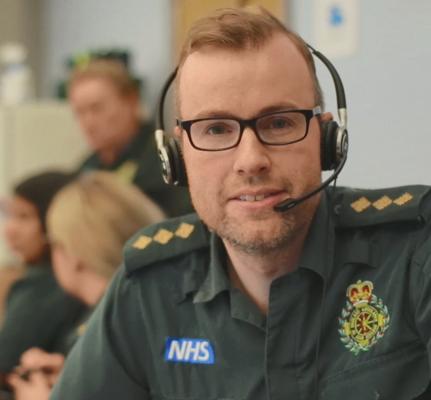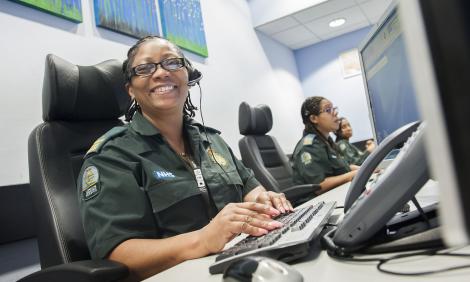Call handler/emergency medical dispatcher
You'll deal with emergency calls from the public and make sure that the right help reaches people as soon as possible.
Working life
Call handlers and emergency medical dispatchers work in ambulance control rooms as part of a team. In most ambulance trusts, call handler and dispatcher are separate roles, but some trusts combine them.
Working quickly and calmly, call handlers take essential details about the patient's condition and location, logging the information onto a computer system.
In extreme cases, they may have to talk a member of the public through an emergency procedure, such as clearing an obstruction from someone's airway. Or they might need to persuade someone they should visit their GP or emergency department rather than sending an emergency vehicle to them.
The information is then passed to an emergency medical dispatcher who uses a triage system to decide which staff and vehicles to dispatch, based on the severity of the situation and the resources available.
While the clinicians are on their way, the emergency medical dispatcher can pass them further essential details so they can go into action when they reach the scene. The pace can be furious and they could need to dispatch 15 vehicles an hour as well as dealing with queries from crews.
Call handlers and emergency medical dispatchers often work under great pressure. They might deal with life-or-death emergencies such as a major incident, a heart attack or drug overdose, or be faced with a situation such as a child with a suspected broken leg.
You could also work as a call handler in the NHS 111 service, taking calls from members of the public about non-emergency health problems. You will typically use specialist computer software to provide the caller with an appropriate response to their healthcare needs within a timeframe.
Ed Green
Regional clinical coordinator and paramedic
Read Ed's storyThe best bits of the job are being able to reassure patients who are waiting for a response, triaging patients so they get the most appropriate care, and managing and supporting the team.

Entry requirements
There are no set entry requirements to become an emergency call handler or medical dispatcher, but employers expect good standards of literacy, numeracy and IT skills. Some may ask for qualifications such as GCSEs, NVQs or equivalent. Employers often ask for relevant work experience. Even where this is not specified, it would be an advantage if you have worked in a call centre or other customer service or healthcare role.
You'll also need need to know how the values of the NHS Constitution apply in your everyday work.
Must-have skills
You'll need to stay calm under pressure, be able to deal with people who may be angry or upset and work well in a team. You'll also need excellent communication and keyboard skills.
Training and development
Training for emergency call handlers and dispatchers will include using the call centre equipment/software, first aid and how to give telephone advice. You may also have the opportunity to do an apprenticeship.
Career development
Working as an emergency call handler is often a starting point to a career in the ambulance service. You could progress to become a team leader at band 6. You would be in charge of a team of call handlers or dispatchers, responsible for allocating work. With further experience you could become a manager or duty manager at band 7, responsible for line management of staff or of the call centre during a shift.
You could take further training to become an emergency care assistant or train as a paramedic. You would have to pass entrance exams and meet other requirements before being accepted onto a paramedic course. Some ambulance trusts offer apprenticeships.
Pay and benefits
Your standard working week will be around 37.5 hours with shift work including evenings, nights, early starts, weekends and bank holidays. You’ll be paid on the Agenda for Change (AFC) pay system, typically starting at band 3 or 4.
You’ll also have access to our generous pension scheme and health service discounts, as well as 25 days of annual leave plus bank holidays.





